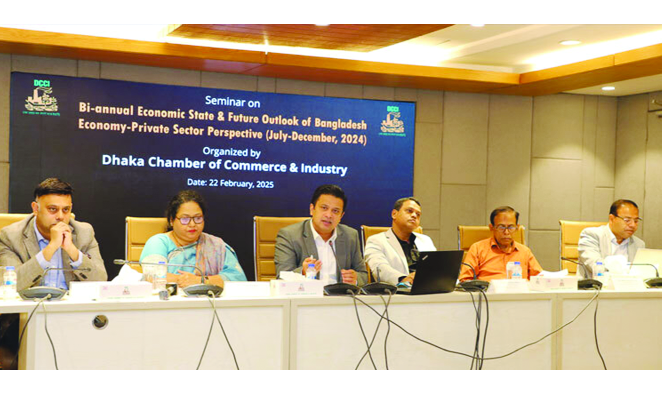

TBT Desk: The Dhaka Chamber of Commerce and Industry (DCCI) has urged the government to enhance financial governance, ensure transparency in the banking sector, reduce interest rates, and continue policy support for expanding both local and foreign investments to create a business- and investment-friendly environment in Bangladesh.
Additionally, the chamber has stressed the need for integrated infrastructure development, improved market management to control inflation, lower VAT on essential goods, and the introduction of a long-term energy pricing policy to support industries.
Speaking at a seminar titled "Biannual Economic Outlook of Bangladesh: Private Sector Perspective (July-December 2024)" on Saturday at the DCCI office in Motijheel, DCCI President Taskin Ahmed emphasised these measures as key to economic stability.
Presenting an overview of Bangladesh's economic performance in the second half of 2024, Ahmed addressed global economic trends, monetary policies, inflation, private sector investment, foreign direct investment (FDI), agriculture, industry, services, SME sectors, energy, logistics, skills development, and financial management. He also recommended government spending cuts to improve revenue generation.
To restore investor confidence, he urged policymakers to increase private sector credit flow into double digits, tighten monitoring of non-performing loans, improve financial governance, and lower interest rates. To curb inflation, he suggested strengthening market monitoring, dismantling illegal syndicates, reducing VAT on essential goods, and raising VAT on luxury items.
Ahmed also underscored the need for continued policy support for investment growth, integrated infrastructure development, and identifying African and Latin American markets as new export destinations for Bangladeshi products. He further called for enhanced industrial security, access to low-cost financing, and uninterrupted power and energy supplies to ensure smooth business operations.
For SMEs, he recommended simplifying loan access procedures, introducing alternative financing methods, and expanding digital financial services. He also stressed the importance of a long-term energy sector plan, improved network management, and affordable energy pricing for both industries and consumers.
Speaking as the chief guest, Additional Secretary (Export) of the Ministry of Commerce Abdur Rahim Khan noted that boosting revenue generation and attracting export-oriented FDI could help bridge the investment gap. He pointed out that there is no longer a significant gap between the bureaucracy and the private sector and urged stronger export competitiveness to tackle post-LDC graduation challenges.
Highlighting the importance of the light engineering sector, he announced that the Ministry of Commerce is setting up a technology centre in Gazipur to enhance the capacity of entrepreneurs in this field.
Dr Mohammad Yunus, research director of BIDS, stressed the need to improve industrial compliance and increase public-private collaboration based on extensive research. To enhance revenue, he suggested expanding the tax and VAT net.
He also emphasised the potential of the leather and pharmaceutical industries in attracting FDI and joint ventures, stating that these sectors hold great promise beyond the RMG industry.
DCCI Vice President Salem Sulaiman and other board members were also present at the event.

